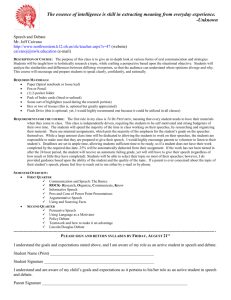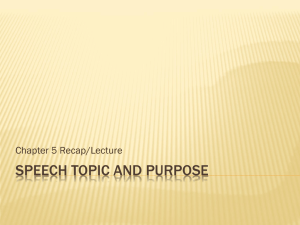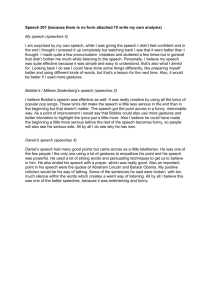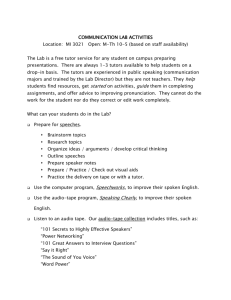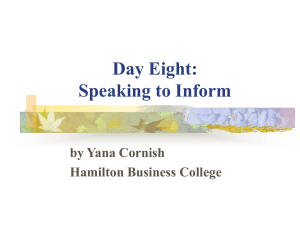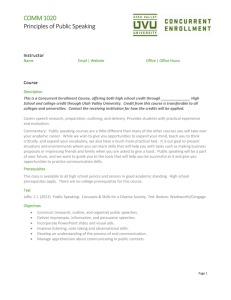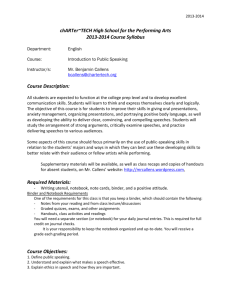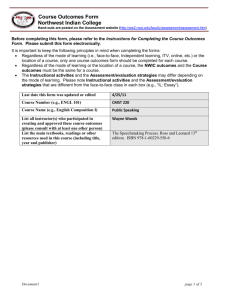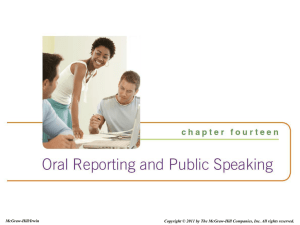Public Speaking and Debate
advertisement
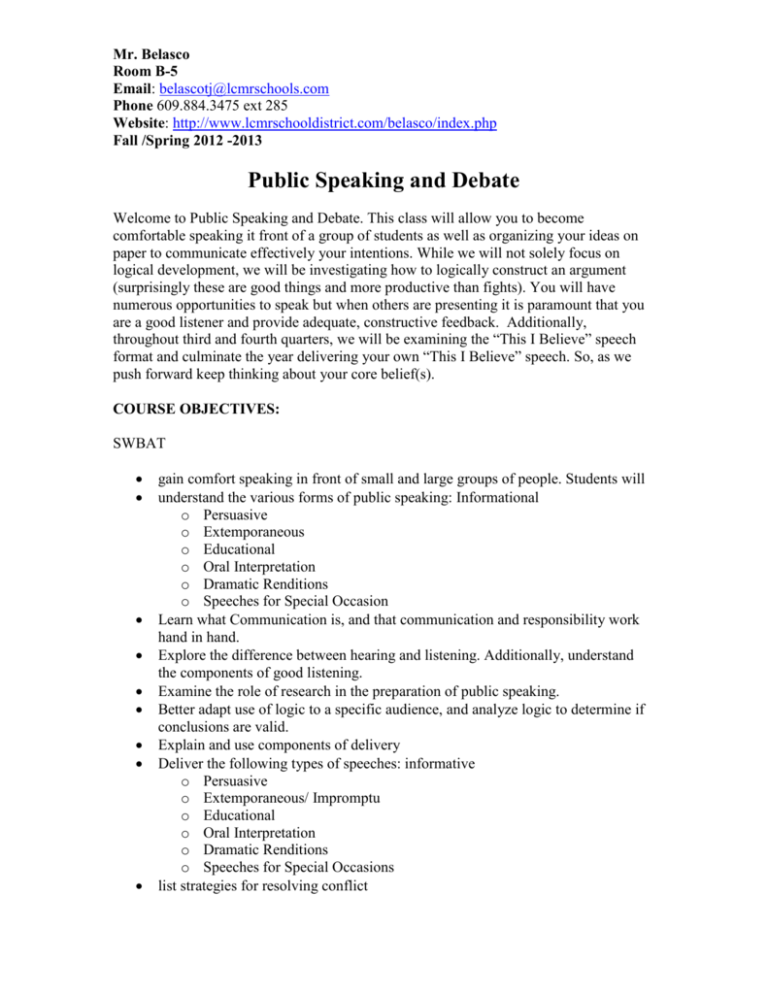
Mr. Belasco Room B-5 Email: belascotj@lcmrschools.com Phone 609.884.3475 ext 285 Website: http://www.lcmrschooldistrict.com/belasco/index.php Fall /Spring 2012 -2013 Public Speaking and Debate Welcome to Public Speaking and Debate. This class will allow you to become comfortable speaking it front of a group of students as well as organizing your ideas on paper to communicate effectively your intentions. While we will not solely focus on logical development, we will be investigating how to logically construct an argument (surprisingly these are good things and more productive than fights). You will have numerous opportunities to speak but when others are presenting it is paramount that you are a good listener and provide adequate, constructive feedback. Additionally, throughout third and fourth quarters, we will be examining the “This I Believe” speech format and culminate the year delivering your own “This I Believe” speech. So, as we push forward keep thinking about your core belief(s). COURSE OBJECTIVES: SWBAT gain comfort speaking in front of small and large groups of people. Students will understand the various forms of public speaking: Informational o Persuasive o Extemporaneous o Educational o Oral Interpretation o Dramatic Renditions o Speeches for Special Occasion Learn what Communication is, and that communication and responsibility work hand in hand. Explore the difference between hearing and listening. Additionally, understand the components of good listening. Examine the role of research in the preparation of public speaking. Better adapt use of logic to a specific audience, and analyze logic to determine if conclusions are valid. Explain and use components of delivery Deliver the following types of speeches: informative o Persuasive o Extemporaneous/ Impromptu o Educational o Oral Interpretation o Dramatic Renditions o Speeches for Special Occasions list strategies for resolving conflict Give examples of ways in which people participate in an informal debate. Prepare for and participate in both informal and formal debate. Write cases that argue for and against value propositions. Debate a complete round in the Lincoln-Douglas format using your organizational, cross examination, and rebuttal Skills. Examine, explore and utilize Parliamentary procedures and Robert's Rules of Order (Basic) Grading Scheme Speeches and Presentations .................... 40% Speech Outlines ………………………...10% Tests and Quizzes.....................................30% Class Participation and Feedback ............20% Basic Course Overview First Quarter: Covering Material in the Textbook Evaluation of Public Speeches Evaluation of speeches (Political, Ted Discussions, recorded speeches) Delivering General Speeches and Discussion Activities o Object of importance o Hot Seat exercise o Collage of values and beliefs o Spatial (house tour) Second Quarter: Developing an introduction : o Attention getter Structuring the speech (body and conclusion) Speeches o Spatial (house tour) o How To Speech (with props) o Dramatic reading o Employment, Interviews, Resumes, Job Search Skills o Hot Seat Exercise (2) Class assessment of student speeches o Small Group Discussion o Individual Feedback Sheets o Class dissection Third Quarter Speeches o Special occasion o Informational Speech o Technology Speech o Extemporaneous speech Class assessment of student speeches o Small Group Discussion o Individual Feedback Sheets o Class dissection This I Believe Speech which will culminate in final exam Fourth Quarter Class Debates Speeches o Persuasive Speech o Impromptu speech o “This I Believe” Speech Class Assessment Helpful Hints for Speaking in Public I. Practice in front of an audience as often as you can. A. At home— 1. Talk to your family; tell them about your day, your feelings, your hopes. 2. On the telephone; practice clear, accurate communication over the “wire.” B. In class—when called on, speak up; offer to lead a group or present a topic. C. In church—sing out the hymns; offer to present a short reading. D. At special occasions— 1. Wish someone well at a celebration. 2. Present gifts or awards at public events, 3. Say thank you with a personal message upon receiving a gift or award. II. Apply techniques for dealing with stage fright. A. If possible, choose a subject you already know something about, then use research to find out what you don’t know about it. B. Remember that audiences do not want you to fail—they want to be informed or entertained, so THINK OF THEIR COMFORT FIRST (try to forget about you). C. Speak slowly and clearly so that every sound comes through—and to avoid getting tongue-tied. D. Practice the various exercises for strengthening your speech muscles. E. Practice your speech in front of a mirror, then for family/friends. F. Give your audience something to do that means they must be listening to you to accomplish it, but not be staring at you! G. PREPARE, PREPARE, PREPARE! III. Add gesture and movement to your speech—don’t “anchor” yourself to one spot. IV. Always approach a speaking opportunity with the correct attitude: A. Don’t think “I HAVE to give a speech today.” B. Instead, think “I have a SPEECH to give today.” (Please complete and return the following page to indicate that student and parents have read and understood the policies and procedures outlined for this course.) PLEASE COMPLETE AND RETURN THIS PAGE We have read the information and we understand the policies and expectations for this class. CLASS: Public Speaking / Speech ________________________________________________________________ (Parent/guardian signature) (Date) ________________________________________________________________ (Parent’s email address) _______________________________________ ________________________ (Student Signature) (Date) Return to teacher by:____________________________

